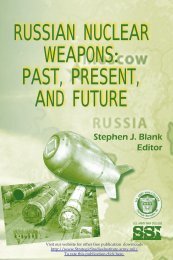The United States and China in Power Transition - Strategic Studies ...
The United States and China in Power Transition - Strategic Studies ...
The United States and China in Power Transition - Strategic Studies ...
Create successful ePaper yourself
Turn your PDF publications into a flip-book with our unique Google optimized e-Paper software.
pricious relations. Both underst<strong>and</strong> the <strong>in</strong>herent danger<br />
of this power transition <strong>and</strong> agree to take careful<br />
measures to manage this process.<br />
<strong>The</strong> bottom l<strong>in</strong>e is that neither the <strong>United</strong> <strong>States</strong><br />
nor <strong>Ch<strong>in</strong>a</strong> wants war, yet there are conditions under<br />
which the two sides can be pushed over the edge to<br />
fight even if they do not want to. <strong>The</strong> Taiwan issue,<br />
as the Ch<strong>in</strong>ese rightly put it, is the most difficult one<br />
<strong>in</strong> U.S.-<strong>Ch<strong>in</strong>a</strong> relations. <strong>The</strong> Ch<strong>in</strong>ese <strong>in</strong>sist that <strong>Ch<strong>in</strong>a</strong><br />
cannot become a true great power without complet<strong>in</strong>g<br />
its mission of national unity; <strong>and</strong> the most outst<strong>and</strong><strong>in</strong>g<br />
piece is Taiwan. <strong>The</strong> Ch<strong>in</strong>ese certa<strong>in</strong>ly hold that<br />
U.S. <strong>in</strong>volvement <strong>in</strong> the Taiwan issue <strong>in</strong> general, <strong>and</strong><br />
the arms sales <strong>in</strong> particular, are the ma<strong>in</strong> obstacles <strong>in</strong><br />
<strong>Ch<strong>in</strong>a</strong>’s mission. In many ways, one can argue that the<br />
settlement of the Taiwan issue is also the time when<br />
the <strong>United</strong> <strong>States</strong> <strong>and</strong> <strong>Ch<strong>in</strong>a</strong> can come to terms with<br />
the power transition bus<strong>in</strong>ess. If the U.S.-<strong>Ch<strong>in</strong>a</strong> power<br />
transition “catches fire,” the trigger will most likely be<br />
the Taiwan issue.<br />
As the power transition unfolds, there will be new<br />
problems. Of note is that by the second half of the next<br />
30 years, there will be new dynamic <strong>in</strong> the two nations’<br />
relations, driven primarily by the chang<strong>in</strong>g power balance<br />
between the two. <strong>The</strong> <strong>United</strong> <strong>States</strong> should take<br />
Organski’s observation below seriously.<br />
It might be expected that a wise challenger, grow<strong>in</strong>g<br />
<strong>in</strong> power through <strong>in</strong>ternal development, would wait<br />
to threaten the exist<strong>in</strong>g <strong>in</strong>ternational order until it was<br />
as powerful as the dom<strong>in</strong>ant nation <strong>and</strong> its allies, for<br />
surely it would seem foolish to attack while weaker<br />
than the enemy. If this expectation were correct, the<br />
risk of war would be greatest when the two oppos<strong>in</strong>g<br />
camps were almost exactly equal <strong>in</strong> power, <strong>and</strong> if war<br />
broke out before this po<strong>in</strong>t, it would take the form of<br />
202

















